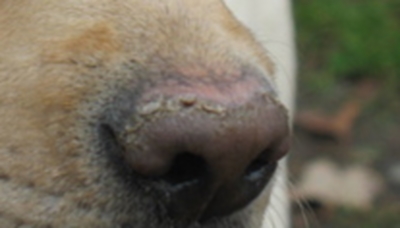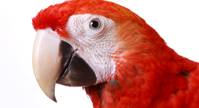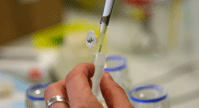Hereditary Nasal Parakeratosis(HNPK)
Description:
 Hereditary Nasal Parakeratosis (HNPK) is an inherited autosomal recessive disorder in Labrador Retrievers. A mutation of the T>G nucleotides in the SUV39H2 gene causes the nose to dry out, leading to chronic irritation and inflammation of the nose's skin.
Hereditary Nasal Parakeratosis (HNPK) is an inherited autosomal recessive disorder in Labrador Retrievers. A mutation of the T>G nucleotides in the SUV39H2 gene causes the nose to dry out, leading to chronic irritation and inflammation of the nose's skin.
Symptoms of the disorder generally appear around 6 to 12 months of age. Affected dogs develop dry, rough, and gray or brown crusts on the surface and edge of the nose. In some cases, painful cracks appear around and on the tip of the nose. If not treated, affected dogs can develop superficial bacterial infections. Over time, the nose often begins to depigmentize, changing skin color from dark to light in color. Although the disorder is not life-threatening, continuous care to reduce the recurrence of excessive nasal crusting is required throughout the life of the dog.
Because HNPK is a recessive disorder, a dog must have two copies of the mutation in order for the disease to manifest. This means that a dog can have one copy of the mutation and not experience any signs or symptoms of HNPK. This dog would be known as a carrier. The carrier can then pass on either the normal gene or the mutated gene to any offspring. If two carriers are bred, there is a 25% chance of having a dog that receives two mutated copies of the gene and would be affected by HNPK.
Acceptable Sample Types:
Animal Genetics accepts buccal swab, blood, and dewclaw samples for testing. Complimentary sample collection kits are available and can be ordered at test now.
This Test Is Relevant For the Following Breeds:
- Labrador Retriever
Results:
Animal Genetics offers DNA testing for Hereditary Nasal Parakeratosis(HNPK). The genetic test verifies the presence of the recessive mutation T>G in the SUV39H2 gene and presents results as one of the following:
| HNPK/HNPK | Affected | The dog carries two copies of the mutant SUV39H2 gene and is homozygous for HNPK. This dog will be affected and will always pass on the defective gene to it's offspring. |
| HNPK/n | Carrier | Both the normal and mutant copies of the gene detected. Dog is a carrier for the SUV39H2 mutation and can pass on a copy of the defective gene to its offspring 50% of the time. |
| n/n | Clear | Dog tested negative for the SUV39H2 gene mutation and will not pass on the defective gene to its offspring. |
Submit a Sample For Testing:
To submit a sample for testing please go to test now.
To
order a sample collection kit please go to order sample collection kits.
Cost per sample is $45.00. Please see our fee schedules below for combination rates.










